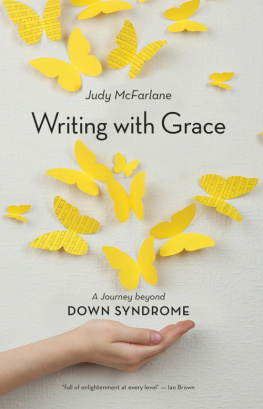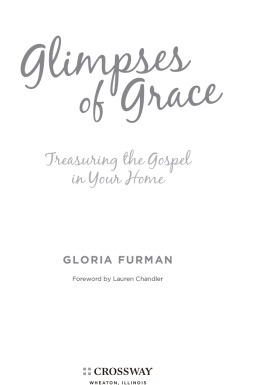Title Page
AN ASPECT OF FEAR
A Journey from Anxiety to Peace
GRACE SHEPPARD
Publisher Information
First published in 1989 by
Darton, Longman and Todd Ltd
1 Spencer Court 140-142
Wandsworth High Street
London SW18 4JJ
Digital edition converted and distributed in 2013 by
Andrews UK Limited
www.andrewsuk.com
1989, 2011 and 2013 Grace Sheppard
The right of Grace Sheppard to be identified as the Author of this work has been asserted in accordance with the Copyright, Designs and Patents Act 1998
Dedication
To David, my husband,
for being there,
and for sharing the risks
Foreword to the Second Edition
By the Very Reverend Nicholas Frayling, Dean of Chichester
From timid, agoraphobic beginnings, Grace Sheppard became a confident woman, whose speaking and writing became an inspiration to thousands of people who found themselves imprisoned by their fears and phobias. This important and touching book tells the story of Graces own experience of agoraphobia - a disabling fear of open spaces and public occasions - and how she overcame it.
For much of her life, Grace played a supportive role to her husband David, a celebrated test cricketer who became the Bishop of Liverpool, and who, with his Roman Catholic partner Archbishop Derek Worlock, was seldom out of the media. David and Derek were affectionately known in Merseyside as Fish and Chips: always together and never out of the paper!
Graces childhood in wartime, through a series of moves and a succession of illnesses, was far from easy. At school she excelled at music and sport, but her exuberant personality was severely sup-pressed, in a way that was to have a lasting effect on her development.
While training as a nursery teacher near Cambridge, she met David, and they married in 1957. During the honeymoon in Italy, Grace caught chickenpox, and was kept in a locked basement isola-tion room for ten days, unable to speak Italian and with virtually no visitors. Their sense of duty led David to decide to return to England to fulfill engagements. Grace described the room as like a prison cell. Unsurprisingly, her confidence - already fragile - was shattered; she spent some weeks in a psychiatric hospital following a breakdown. The following years, as a priests wife in the East End of London, were very hard.
The birth of their daughter Jenny brought them joy, but the onset of ovarian cancer, and the ensuing radiotherapy, set back her progress. Grace never forgot that she was the only woman in her ward to survive the disease and the treatment ...
They left the Mayflower Centre, where David had been the War-den, and within which Grace had found fun and friendship, when he became Bishop of Woolwich, across the Thames. They settled into a house in inner-city Peckham. Davids area of responsibility, in both senses of the word, was enormous, and Grace found life difficult and isolating. She and Jenny joined the local church, however, and she set about making their home a place of welcome and hospitality. Clergy and their families, many of them in tough parishes, found a generous welcome, and on one occasion, David and Grace invited all the local shopkeepers to supper - to their considerable surprise! Grace found she could get alongside local people by enlisting their help in catering and practical tasks.
David became Bishop of Liverpool in 1975, and Grace faced an even greater challenge in coping with the expectations on the wife of a public figure, and the hell of an open space that was Liverpool Cathedral, though she came to love it. She took to wearing a loose cape to conceal her trembling whenever she had to go there.
It was at this time that Grace realised that she needed professional help, and under the care of a sensitive therapist, began to come out of herself and take a fuller part in public life, including solo engagements. The final make or break moment occurred during a visit to South Africa which she and David made with Archbishop Derek and an ecumenical party. Grace was accidentally left behind in Soweto township, and had to place herself in the care of unknown African people. At this point, she said, my fear evaporated and my agorapho-bia withered and died.
This book tells an extraordinary story, and a very powerful one, which David and some of her friends encouraged Grace to share with others who might themselves be trapped and unable to cope, not knowing where to turn for help.
The subsequent sequence of events - Davids battle with cancer and Graces devoted care of him; her own cancer and the further inspiration she brought to people right up to the end of her life in November 2010 - does not belong to this book, but it is certain that, during those final years, she drew on the experiences she has related in these pages.
Underpinning all her struggles, Grace was sustained by a deep - and deepening - faith in Jesus Christ, and a real sense that Jesus was with her every step of the way. Friendship with her Lord spilled over into human friendships of many kinds, and with them, the discovery of the divine imperative of unconditional, non-judgmental accept-ance of other people, whatever their circumstances.
But this is not a preachy book. Grace affirms her own faith, of course, but people of other faiths or none can find encouragement from the authors practical advice, and the courageous honesty with which she has written about her own dark places, and the inner strength she discovered to journey into them.
When An Aspect of Fear was first published, it made a terrific impact, chiefly because it tackled a subject that had for too long been regarded as off limits. Graces own struggles, and the advice she offered, have inspired all sorts of people to confront their own fears in a way they would not have believed possible.
Those of us who were fortunate enough to share some of Graces struggles, and to know her well, miss her terribly, but we can take comfort from all that she has left us. Grace Sheppard was an inspira-tion to many people, known to her and unknown. Through this honest and readable book, she will reach many more. As Grace herself would be the first to say, Thank God for that.
Foreword
Many of us know Grace Sheppard as good company. This book introduces us to something of the cost behind it. It should enlarge our understanding of ourselves and our appreciation of her.
It is commonly believed that to show vulnerability causes loss of respect and love amongst those around us. The prospects of such a loss can make us determined to go to almost any lengths to hide our fearful other selves, even from those closest to us. It is for this reason that I believe that this remarkable book is a record of astonishing courage and confidence. Grace has chosen to meet her own fears by placing them at our service. This is a most generous act of trust.
Here we read of her own battle with fear. She tells her story with arresting fluency. The detail is literally painstaking; the analysis direct. Although the problem she addresses is one which may reach its most acute form in what are known as public figures, it is also true that each one of us has a protective public face upon which we may rely too much. This book confirms the lighthearted wisdom expressed by W. H. Auden earlier this century when he said that
Private faces in public places
Are wiser and nicer
Than public faces in private places.
I am sure that many will be grateful to Grace for writing this book and will come to share my appreciation of her, an appreciation that has grown by learning something of her experience and a little more about myself.
Preface
Somehow, we have not been encouraged to talk about it before. This remark, by a shopkeeper in Dunoon, sums up what I believed before setting out to write about the subject of fear. I chose this subject because it is one I am familiar with and, by facing it over the years, I have come to realise that it is not only a human response that we all share as human beings, but an essential one which needs recognising, accepting and managing. Effectively managed, fear ceases to control our actions, and exists to warn us against anything that will destroy our lives. Ignored or unacknowledged, fear takes control and we find ourselves caught up in varying degrees of destructive behaviour, which can lead to emotional or physical violence.
Next page










